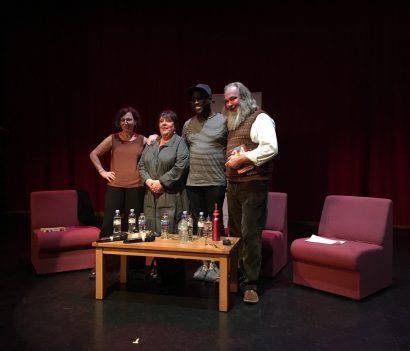 MLF Chapter & Verse
MLF Chapter & Verse
The Manchester Literature Festival Blog
Review: 24 Stories, take 2
Centre for New Writing student Pippin Major is impressed by the unifying nature of stories.
There’s a hum of lively chatter in Manchester’s Dancehouse theatre as the crowd awaits the arrival of the four stars of tonight’s event. No doubt it is the star-power of Kathy Burke that has filled most of the seats, and indeed this is a topic visited again and again throughout the event. The book we are here to celebrate is 24 Stories, a collection of short stories written to raise money for those affected by the fire at Grenfell Tower, which claimed the lives of seventy-two of London’s vulnerable citizens, whose backgrounds were wildly different to those of this events crowd. The crowd is almost homogenous – mostly white, mostly middle-class, mostly middle-aged – and this incites a strange atmosphere.
24 Stories is ambitious, especially considering the speed with which it was compiled. 24 short stories, one to represent each of Grenfell’s 24 floors. Work began on the project just days after the tragedy, propelled by social media. Burke is the book’s driving force, and she dominates the discussion with care, humour, and an impressive level of self-awareness. John Mitchison, founder of the crowd-sourced publishing house Unbound, introduces her and the other guests, Nina Stibbe and Mike Gayle, to the stage with careful mention of the lives lost and the book’s intent to raise money for those who survived the tragedy.
Burke is quick to say that the contributors ‘didn’t want it to be a sad book… [we] wanted it to be about hope and community’. Through a string of providential twitter messages and a fortunately-timed appearance on the show The Last Leg, the project attracted over 500 submissions, with a strong emphasis on discovering unknown writers to supplement the voices of the likes of Irvine Welsh. Burke reads a piece by relative unknown Susan E Barsby. The story is a quiet one about finding an escape from the hum-drum of city-life through the eyes of an elderly man discovering the joy of ice-skating.
Next we are treated to an eclectic snapshot into the early life of Nina Stibbe. Stibbe came to London to work as a nanny on Gloucester Crescent, not far from the home of national treasure Alan Bennett. She came to the 24 Stories project through twitter. ‘We were just cheeky,’ she says, ‘I just messaged them’. Her contribution is ‘an absolutely true story… not an urban story… [a story] about coming from the city to the country side’. It considers the rituals humans use to try and relate to one another. Stibbe laughs as she recounts her childhood musing; ‘why does everyone keep bringing flowers?’.
While Stibbe has two published novels; the next contributor Mike Gayle has an impressive fifteen. He was connected to 24 Stories via a direct twitter message from Burke. He agreed immediately, but later was incredulous; ‘I hate writing short stories’, he tells us. This is surprising as the piece he reads is a moving and jovial one about a young boy who stops in the street to help an old man who has fallen in his garden. Despite the old man’s protests, the boy says ‘I’m going to help you anyway’.
Burke reads a moving piece by an unknown writer, Kat Day, and it cannot be ignored that none of the pieces read directly address the fire at Grenfell. ‘Only two stories that deal with Grenfell itself obliquely’ appear in the book, Mitchison tells us. None of the collaborators are trying to co-opt the experiences of those in the tower, and in fact seem to be asking themselves about the many ways in which human compassion manifests.
The event is closed out by a discussion of how each guest came to value stories as a way to connect with other people, and why a collection of them seemed such an appropriate response to a tragedy such as Grenfell. They provide an opportunity to share, to regroup, to remind us of our ability to connect with one another. It’s impossible to leave politics checked at the door of an event such as this, but these contributors are well aware of it. 24 Stories is indeed about hope and community, not just in the content of its pages, but the very intent behind it’s conception and execution, and so is the event to celebrate it. It bridges the gap in demographics between the crowd and those directly impacted by the Grenfell disaster, not by claiming that the crowd – or indeed the people who wrote the twenty-four stories – can fully understand, but by fostering compassion in that most human way; telling stories.
